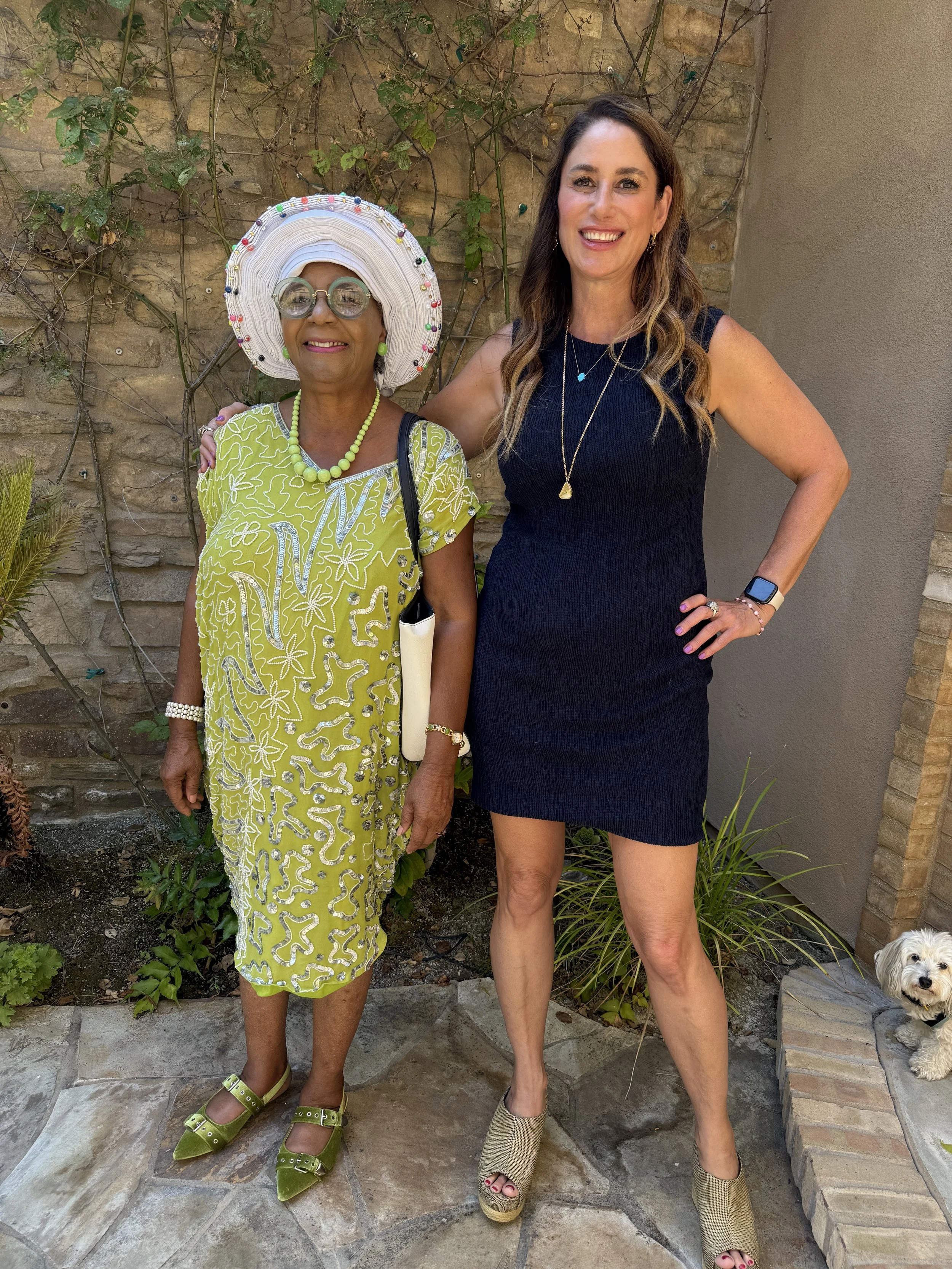Ep. 308 Dr. Theresa Ukpo
Dr. Theresa M. O. Ukpo’s authoritative work The Forgotten Genocide on the Nigerian Civil War (1967–1970) is deeply rooted in her personal experience of the conflict and her subsequent academic career dedicated to understanding large-scale trauma. Born in Owerri, Imo state, Nigeria, to parents who were notable pioneers in the nation’s education system, Dr. Ukpo demonstrated exceptional academic promise early on, earning a full scholarship to Owerri Girls’ Secondary School. However, this promising high school education was directly interrupted by the outbreak of the Nigeria-Biafra War, a period of massive geopolitical trauma that raged from 1967 to 1970.
Dr. Theresa Ukpo and Jeanne Pepper September 2025
Dr. Ukpo’s earliest life in Nigeria was characterized by a strong foundation in education and the sudden, brutal disruption of war. Her parents created a family environment that highly valued intellectual pursuits and social contribution. She developed a keen interest in formal schooling from a very young age and distinguished herself academically, finishing her first school leaving exams with 'Distinction'.
This academic excellence earned her a full scholarship to attend Owerri Girls' Secondary School. This scholarship was a significant relief for her family, as secondary school education in Nigeria was not free, underscoring the high value placed on the achievement. However, her high school education was directly interrupted by the Nigeria-Biafra War, a devastating conflict that raged across the region from 1967 to 1970. Her youth was thus placed directly within the context of massive geopolitical trauma and violence.
Following the successful completion of her high school education amidst the fallout of the war, Dr. Ukpo was awarded a pivotal full scholarship to pursue a college education in the United States. This opportunity served as her gateway out of the post-conflict environment and into specialized higher education. She began her US academic journey by majoring in Chemistry at Rosemont College in Pennsylvania, later advancing her expertise by pursuing a Master’s Degree in Community Health Education at Temple University. This progression from a rigorous scientific base to community wellness and health education laid the groundwork for her eventual specialization as an Epidemiologist, the career path that allowed her to scientifically analyze the population trauma she had experienced firsthand in Nigeria. war was a catalytic event that fundamentally shaped her view of health, society, and justice. This civil war is widely regarded by scholars as the most notorious conflict witnessed in Africa before the atrocities in Liberia and Rwanda, and many classify the systematic violence perpetrated against the Igbo people of Eastern Nigeria as a “heinous crime of genocide.” Dr. Ukpo's personal exposure to this systemic violence and the resulting displacement and loss underscored for her the profound connection between political instability and population health, leading her to eventually pursue a Ph.D. in Epidemiology to study these dynamics scientifically.
Her commitment to documenting this era culminated in her book, The forgotten genocide. The title itself acts as a historical and political declaration, aiming to combat the prevalent overlook of the atrocities committed during the war and ensure the catastrophic suffering, primarily among the Igbo population, is acknowledged. While historical accounts of the war often focus on the sociopolitical divide and have generally prioritized male perspectives, Dr. Ukpo’s work shifts the focus. Her scholarship sheds light on the activities of women and their experiences during the war, thus illuminating a critical, but hitherto neglected, aspect of the social history.
By centering her work on the systemic political violence and human rights violations witnessed during the Nigeria-Biafra War, Dr. Ukpo frames historical denial and unresolved conflict not merely as political issues, but as foundational public health crises. Her detailed analysis provides a crucial historical context for understanding contemporary security challenges and the ethno-religious conflicts that continue to destabilize Nigeria today. This unique blending of personal history, scholarly rigor, and historical advocacy makes her an authoritative voice on the long-term human costs of unresolved conflict.
Executive Producer and Host: Jeanne Pepper
Original Theme: Jay Bernstein
Special Thank You to our volunteers
FOLLOW or SUBSCRIBE to PeppTalks with Jeanne
Facebook: PeppTalks with Jeanne Pepper
Instagram: @pepptalkswithjeanne
TikTok: @pepptalkswithjeanne
LinkedIn: Jeanne Pepper

